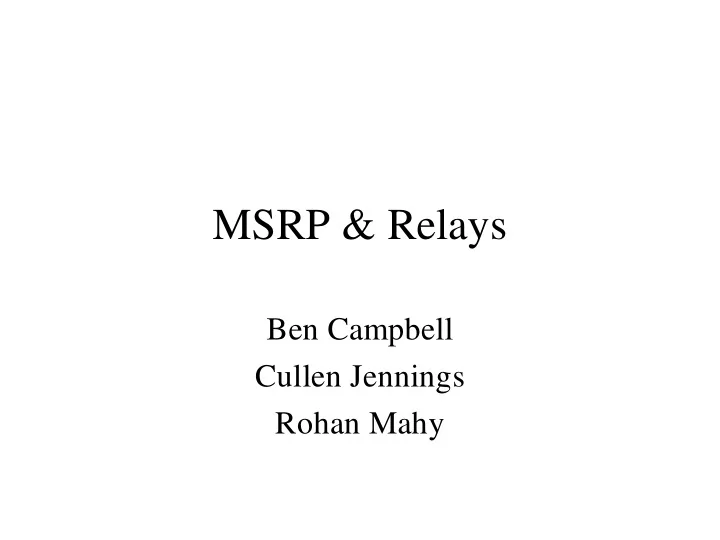

MSRP & Relays Ben Campbell Cullen Jennings Rohan Mahy
SIMS & MSRP • The authors of both drafts & chairs want to take a few good ideas out of SIMS and apply them to MSRP and a Relays draft. • This should allow MSRP to have all the advantages of SIMS.
Key SIMS Ideas to use • Don’t mandate length of message when you start sending it so you can interupupt a message being sent • Allow a message to be sent in chunks • Connection can be shared (not one connection per session) • Messages have correlation information
Proposed MSRP Changes • URLs Identify Endpoints – A session is identified by a URL tuple, not a single URL. – All SEND requests include the target URL – VISIT requests carry the URL of the active party.
Proposed MSRP Changes • Bring back shared connections. – Needed if relays exist – Made easier by the next two slides • Chunking • Interruptible message framing • If relays exist, we need shared connections – relay to relay – endpoint to relay • If we have endpoint to relay, peer to peer is not that different.
Proposed MSRP Changes • Change message framing – Use boundary, rather than message size – Necessary to allow message interruption without destroying connections. – Required if connections are shareable.
Proposed MSRP Changes • Allow Chunking – Greatly helps some of the HoL blocking issues. – Endpoints should at least be able to receive chunks. – Chunking handled at MIME layer • message/byteranges
Proposed MSRP Changes • Allow return-receipt request – Servers same purpose as INFORM in SIM – Not needed for peer to peer – Can this be session-scoped? • negotiate in SDP exchange, rather than by requesting it in each SEND request
Co-Media • Direction attribute not needed with one or more relays – Clients always initiate the connection when talking to a relay. – Need to allow direction to be ommited, and specify behavior
Co-Media • Do we really need it at all? • How common is the use case where one end is behind a NAT, the other end is not, and no relay is available – This significantly complicates things – Allows optimization to get rid of relay – Implementing co-media shows it is very hard to get it to work
Proposed Relay Draft (MSRP- Relay) • Get a route set from SDP • Relays can re-chunk message
Relay Requirements Deadlock • We have 3 implied requirements that cannot be all solved. These lead to the original issues with relays – Connection Sharing – Relays with small, fixed buffers – No application level flow control
Root Problem • Relay Must buffer Relay arbitrary number of messages to avoid Shared Connection blocking messages Relay to fast target Fast Link Slow Link Client Client
Proposal • Live with it – Relays will need to buffer arbitrary amounts of data – Relays will reject requests when buffers get too full • This rejection is hop-to-hop. Sender may not see the error if there is an intervening relay • Return receipt mechanism important here.
MSRP Harmonization • Ok with changes to base? • Adopt this direction for relay?
Wrapped Types Issue • Complex • Suggestions to simplify – CPIM gateway attribute – Envelope attribute (single valued) • Proposal: Leave as is
Recommend
More recommend